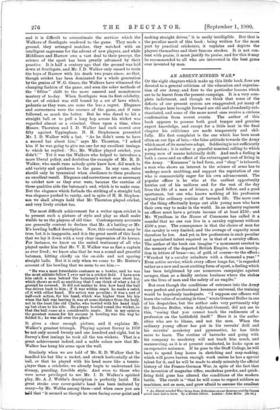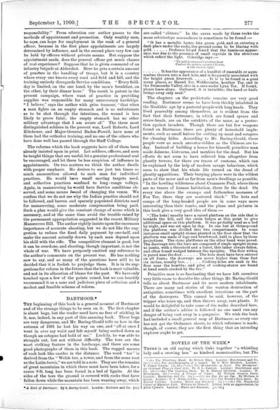AN ABSENT-MINDED WAR.*
OF the eight chapters which make up this little book, four are devoted to a general criticism of the education and organisa- tion of our Army, and four to the particular lessons which are to be learnt from the present campaign. It is a very com- plete indictment, and though we think that some of the defects of our present system are exaggerated, yet many of the charges here brought forward are old and abundantly sub- stantiated, and some of the more novel ones receive a curious confirmation from recent events. The author of this book appears to possess both good temper and genuine expert knowledge, and except for a little heat in the final chapter his criticisms are made temperately and skil- fully. His first complaint is the one which has been most often on our lips of late,—the false attitude towards the Army which most of its members adopt. Soldiering is not sufficiently a profession ; it is rather a graceful nominal calling to which young men of means habitually drift. And such a feeling is both a cause and an effect of the extravagant cost of living in the Army. " Keenness " is bad form, and " shop " is tabooed; a man who shows an interest in the science of arms has to undergo much snubbing, and support the reputation of one who is commercially eager for his own advancement. The popular officer is he who at the earliest opportunity hurries out of his uniform and for the rest of the day lives the life of a man of leisure, a good fellow, and a good sportsman, but one who knows nothing of his profession beyond the ordinary routine of barrack life. The mere cost of the thing effectually keeps out able young men who have their own way to make in the world. In an infantry regiment an officer must have a private income of at least £150; and Mr. Wyndham in the House of Commons has called it a scandal that no one can live in a cavalry regiment without £500 a year. The consequence is that the choice of men for the cavalry is very limited, and the average of capacity must therefore be low. And yet in few professions is such peculiar and specialised talent required as in that of a cavalry officer. The author of the book can imagine "a monument erected to the memory of the departed British Empire, with an inscrip- tion in letters of brass—no, of gold, of course—to the effect: Wrecked by a cavalry subaltern with a thousand a year." Even active service, which every officer longs for, "is regarded rather as a new and most exciting form of sport, a feeling which has been heightened by our numerous campaigns against savages, than as a deadly serious business where the stakes are the lives of men and the safety of an empibe."
But even though the conditions of entrance into the Army were perfect and professional keenness universal, the training would be hopelessly inadequate. "I suppose our officers will learn the value of scouting in time," wrote General Buller in one of his despatches, but the author asks very pertinently why Sir Redvers Buller, when Adjutant-General, did not see to this, "seeing that you cannot teach the rudiments of a profession on the battlefield itself." Here it is the autho- rities who are to blame, and not the men. When the ordinary young officer has put in his recruits' drill and his recruits' musketry and gymnastics, he has little more to learn. The routine of barracks and going with his company to musketry will not teach him much, and manceuvring, as it is at present conducted, he looks upon as an expensive nuisance. If he goes to the Staff College, he will have to spend long hours in sketching and map-making, which will prove barren enough work unless he has a special talent for it, and he will be made to study minutely the official history of the Franco-German War, in spite of the fact that the invention of magazine rifles, smokeless powder, and quick-. firing field guns has altered, the conditions of the modern battle. The result is "that he will come to regard soldiers as machines, not as men, and grow afraid to assume the smallest
* An Absent-minded War: being .Some Reflections on our Reverses put the Causes which have Led to them. By a British Officer. London : John Milne. ed.]
responsibility." From education our author passes to the methods of appointment and promotion. Only wealthy men, he saps, can hope for employment in the rank of a general officer, because in the first place appointments are largely determined by influence, and in the second plaze very few can be held by officers without private means. But suppose the appointment made, does the general officer get much chance of real experience? Suppose that he is given command of an infantry brigade at Aldershot. Here he gets a certain amount of practrce in the handling of troops, but it is a country where every one knows every road and field and hill, and the training entirely disregards Service conditions. "Every field- day is limited, on the one hand, by the men's breakfast, on the other, by their dinner hour." The result is patent in the present campaign, where want of practice in providing supplies was responsible for many unnecessary hardships. "I believe," says the author with grim humour, "that when a man fights on an empty stomach and is so unfortunate as to be shot through the intestines, the wound is less likely to prove fatal; the empty stomach has no other military advantage that I am aware of." The three most distinguished soldiers in the present war, Lord Roberts, Lord Kitchener, and Major-General Baden-Powell, have none of them had the orthodox training, and no one of the others who have done well has passed through the Staff College.
The reforms which the book suggests have all of them been already insisted upon in print. Let soldiers, officers, and men be taught things that are useful, let a genuine professional zeal be encouraged, and let there be less suspicion of influence in appointments. On two matters we think the author dwells with proper emphasis. He desires to see just ten times as much ammunition allowed to each man for individual practices. He would have small moving targets used, and collective practices confined to long - range volleys. Again, in manceuvring he would have Service conditions ob- served, and some means found of changing the venue. We confess that we do not see why the Indian practice should not be followed, and barren and sparsely populated districts used for manceuvring, some moderate compensation being paid. Such a plan would give the constant change of scene which is necessary, and at the same time avoid the trouble raised by the permanent appropriation suggested in the recent Military M.anceuvres Bill. The author rightly insists upon the enormous importance of accurate shooting, but we do not like the sug- gestion to reduce the fixed daily payment by one-half, and make the amount actually drawn by each man depend upon his skill with the rifle. The competitive element is good, but it can be overdone, and shooting, though important, is not the whole of wax. We have purposely omitted any reference to the author's comments on the present war. He has nothing new to say, and so many of the questions have still to be decided that it is foolish to prejudge them. It is in its sug- gestions for reform in the future that the book is most valuable, and not in its allocation of blame for the past. We have only touched upon a few of the points raised, but we can heartily recommend it as a sane and judicious piece of criticism and a modest and feasible scheme of reform.



































 Previous page
Previous page